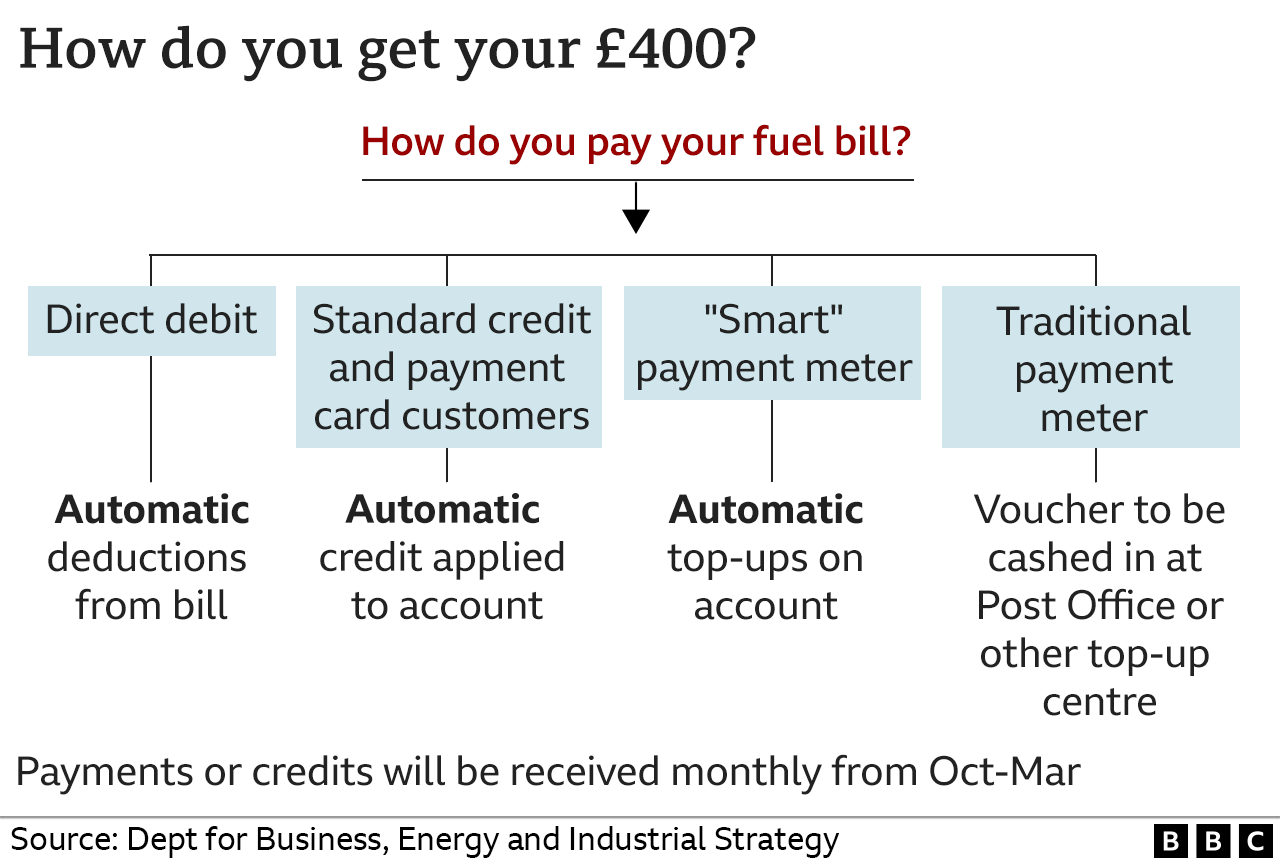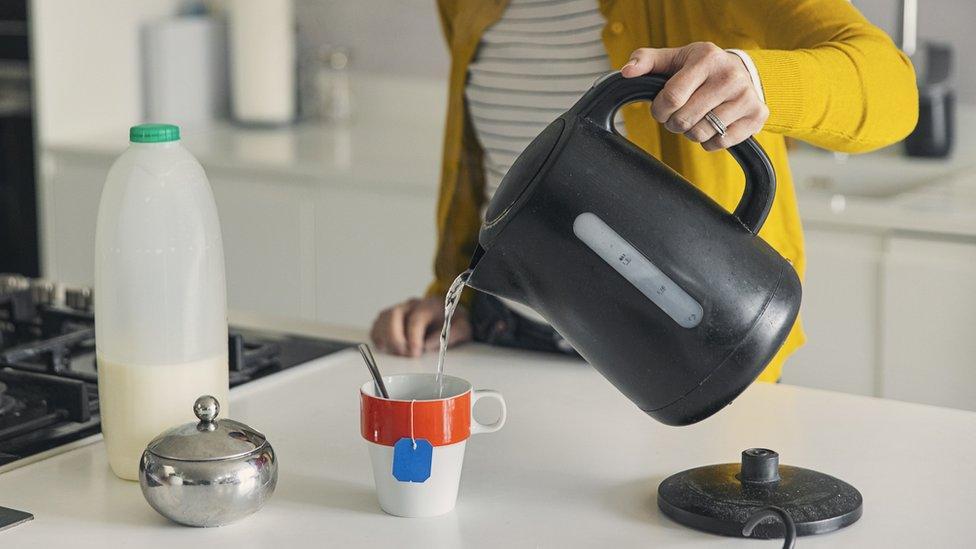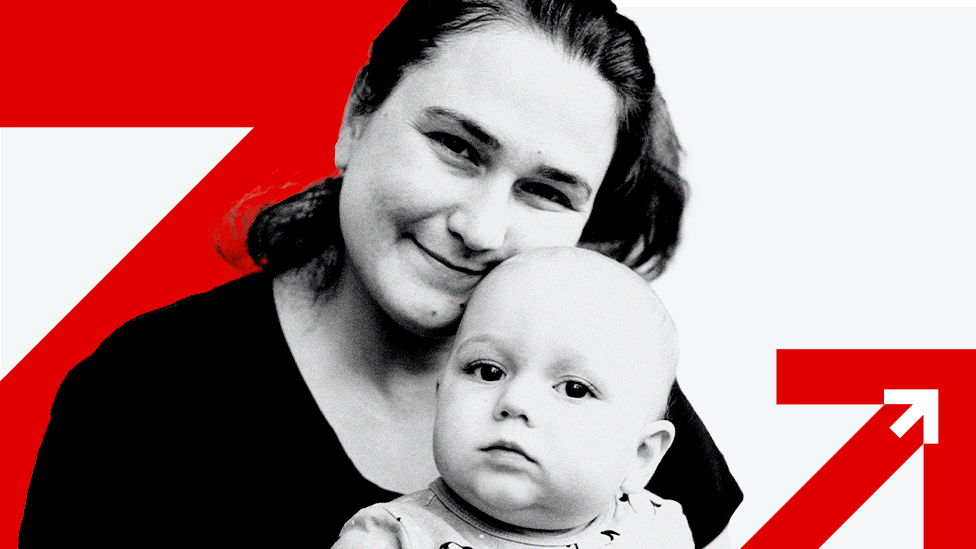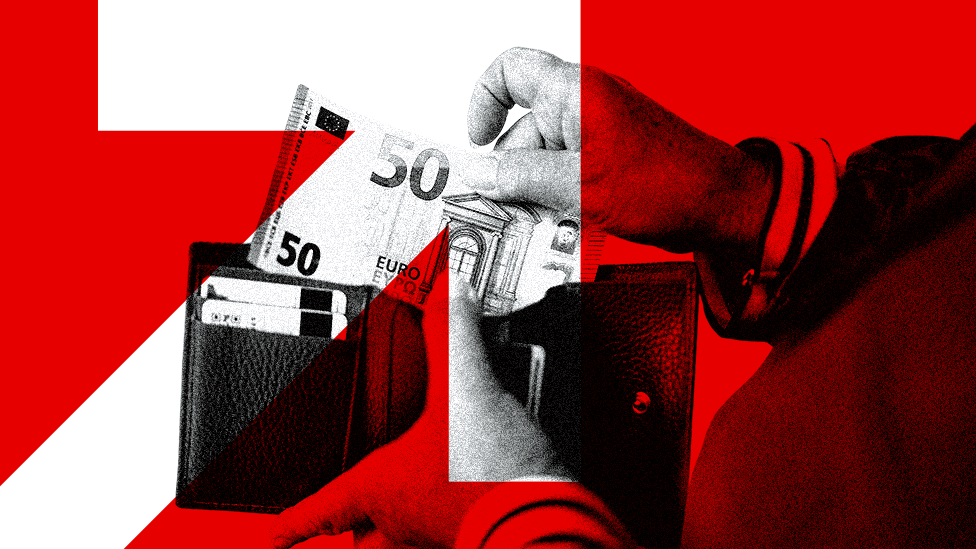£400 energy payment: Fears landlords to keep renters' rebate
- Published
- comments

Tenants whose bills are included in their rent could miss out on the government's £400 energy rebate because it is paid to their landlord, charities have warned.
Housing charity Shelter said this group were "at the mercy of their landlord passing on this much-needed support".
An estimated 585,000 households, external - 13% of private renters - have energy bills included in their rent.
The government said it expected landlords to pass on the discount.
The National Residential Landlords Association (NRLA) also said that where tenants incurred the cost of increased energy bills, the discount should be passed on to them by their landlord.
However, a spokesperson pointed out there would be cases where all-inclusive rents had been set without reflecting the recent surge in energy costs.
"The government needs to ensure that its scheme recognises such cases where it is the landlord who is ultimately paying the cost of increased bills, rather than the tenant," the spokesperson added.
The typical household energy bill could hit £3,615 a year in January, up from £1,400 a year in October 2021, according to a forecast from consultancy Cornwall Insight.
The government has announced a package of measures to help households with the rising cost of living, including a £400 discount on energy bills.
Last week the government revealed details of how people in England, Scotland and Wales would receive the payment.
The Treasury is still in discussion with Stormont ministers about how to make the payment to households in Northern Ireland.
The money will be paid in six instalments, with a discount of £66 applied to energy bills in October and November, and £67 a month from December to March 2023.
How the money is received will depend on how you pay your bill.
However, for tenants whose energy bills are included in their rent, their landlord would receive the discount as they are the bill payer.

Helen, 25, rents a room in a four-bed house in Leicester with bills included.
She is worried that if she asks her landlord to pass the £400 payment on to her he will increase her rent when her contract is up for renewal later this year.
"I'm leaning towards not rocking the boat because I'm dreading that conversation about renewing and what my new rent will be for the next six months," she told the BBC.
Helen, who did not want to give her surname, is a PhD student and her stipend will increase by just 2% in September - well below the rate prices are rising, with UK inflation hitting 9.4% in June.
If her rent increased she said it would be "a real stretch" to cover her other living costs.
As she shares a house with strangers, Helen said it was also difficult to discuss the situation with her housemates, who she would have to share the payment with. She did not know if they would feel the same as her.
'Fall through the cracks'
When it comes to utility bills, government guidance, external states that landlords who have a domestic electricity contract with a licensed supplier and then resell the electricity to their tenant, based on usage, must comply with maximum resale price rules.
This means landlords are not allowed to make a profit on energy they are reselling.
Landlords with a domestic electricity connection where a fixed cost for energy is included in the rent "should also be passing on the discounted payments to tenants", the government said.
But charities have raised concerns that landlords will not pass on the saving to their tenants.

Are you a renter worried about missing out on the £400 energy rebate? Please email: haveyoursay@bbc.co.uk, external.
Please include a contact number if you are willing to speak to a BBC journalist. You can also get in touch via WhatsApp: +44 7756 165803, external and Twitter: @BBC_HaveYourSay, external

"There's no specific legal obligation for landlords to pass on this support but they aren't allowed to overcharge tenants for the energy they've used or make a profit on it," Polly Neate, chief executive of Shelter, said.
"This could be the case if they pocket the government support and continue to charge the same rate for utilities."
"Landlords can only charge for energy used, the standing charge and VAT. So, it's worth making a note of how much energy you're using to make sure you're not paying more than you should," she added.
Ms Neate said it was "unfair that those at the sharp end of this crisis could miss out on this much-needed support" and urged the government to make sure it went "to the people who need it the most".
Gillian Cooper, head of energy policy at Citizens Advice, said there was no clear guidance on how landlords should pass on the discount "or any law to make sure they do".
"We're worried that renters could fall through the cracks and miss out on extra cash," she added.
Dan Wilson Craw, deputy director of campaign group Generation Rent, said: "A lot of landlords have already raised the rent to take account of higher energy bills and there's no easy way for tenants to ask them to pass on the £400 grant if they don't want to - threatening to move out is one approach but that is difficult when rent on a new property could be much higher."
He suggested tenants could ask their landlord to take into account the £400 rebate the next time they tried to increase their rent.
But he added that until Parliament passed the Renters Reform Bill, tenants could still be evicted without reason if they complained.

Landlord Annette Munro hasn't increased the rent on her flat, despite soaring energy costs
However, some landlords who have not increased their tenants' rent said they did not think they should have to pass on the £400 discount.
Annette Munro, 59, rents out a flat in London with bills included and believes landlords should only have to pass on the rebate if they have hiked rents due to rising energy costs.
She said the monthly energy bill for her property had increased from £90 to £267 but she has not put up the rent for several years because her tenants are "already struggling".
"If landlords haven't put [the rent] up and have absorbed that cost because they like their tenants and they want to keep them, then I think that they should be able to take the £400," she told the BBC.
- Published29 July 2022

- Published13 May 2022

- Published15 February 2024

- Published21 December 2022

